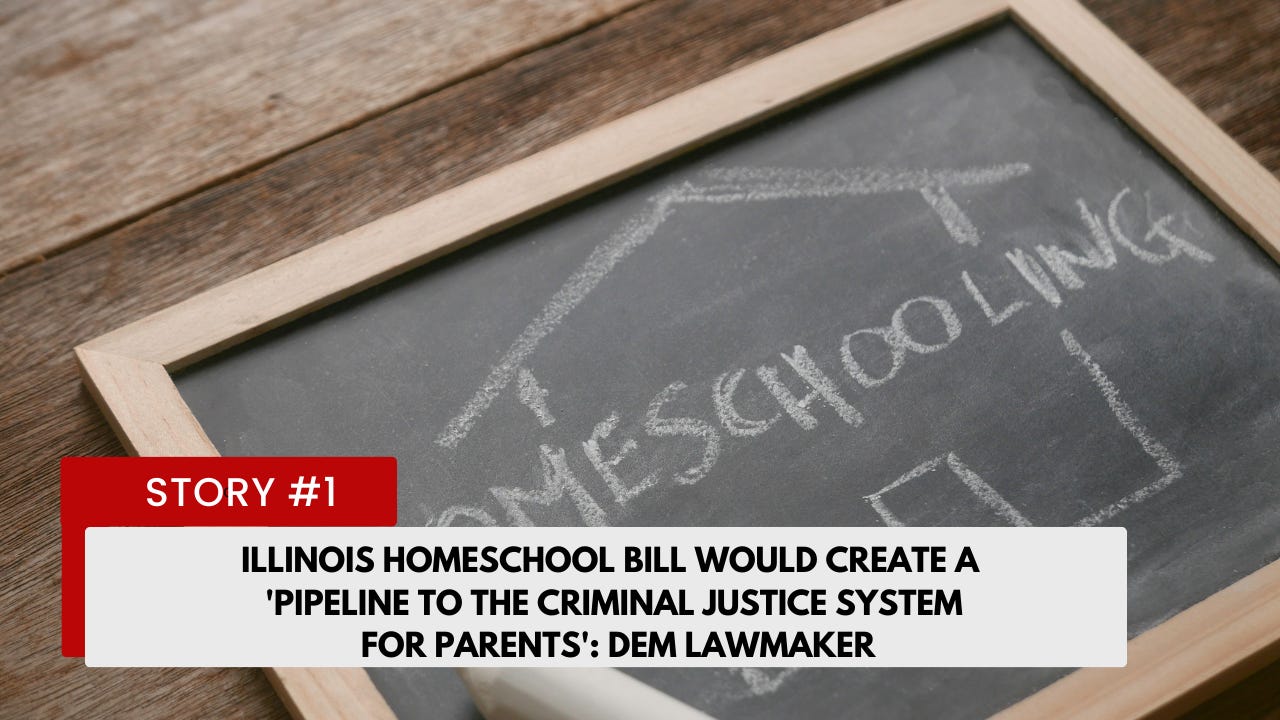

CHICAGO, IL - An Illinois bill that could drastically change homeschooling rules in the state would create "a pipeline to the criminal justice system for parents," a state Democratic lawmaker warned Thursday.
Rep. La Shawn Ford, who represents a district that includes parts of Chicago, made the remark as parents, students and opponents of HB 2827, the Homeschool Act, rallied in the city’s downtown.
The bill, which is advancing through the Illinois state legislature, would charge parents with a misdemeanor if they fail to register their kids in a "homeschool declaration form" to the nearest public school they would otherwise be attending. It also requires documentation of immunizations and health examinations for children who wish to participate in public school activities. Click here to read more.

TAMPA, FLA — Florida Gov. Ron DeSantis expressed his support for a bill banning what he called weather modification “nonsense” before it hits the Senate floor on Thursday.
SB-56, dubbed the so-called “chemtrails bill” after its sponsor pointed to the conspiracy theory while defending the bill in committee, prohibits “the injection, release, or dispersion, by any means, of a chemical, a chemical compound, a substance, or an apparatus into the atmosphere within the borders of this state for the express purpose of affecting the temperature, weather, climate, or intensity of sunlight.”
“Many of us senators receive concerns, complaints on a regular basis regarding these condensation trails, aka chemtrails,” bill sponsor Ileana Garcia said in a committee hearing last month. “There’s a lot of skepticism.”
The bill would also require the Florida Department of Environmental Protection to set up a system allowing residents to report “suspected geoengineering activities” and directing the FDEP to investigate those claims. Click here to reasd more.

The U.S. economy is staring down the barrel of a tax increase to the tune of several hundred billion dollars. If the Trump administration follows through with its threats (never a sure thing), we will this week see the imposition of so-called reciprocal tariffs to ostensibly match the burden placed by other countries on U.S. exports.
As President Donald Trump and administration officials tell it, the move is rooted in a desire to stop foreign countries from ripping Americans off through unfair trade. But such claims warrant considerable skepticism.
The administration’s words and actions make it increasingly clear that this reciprocity talk is just a fig leaf for higher tariffs. They aren’t a means to an end but the end themselves. And unless Congress acts − an unlikely proposition − American businesses and consumers alike will suffer.
On its face, the pursuit of tariff reciprocity may seem a commonsense approach. Although not exactly the golden rule, it seems darn close. Why not give U.S. trading partners a taste of their own medicine?
But the seductive logic of reciprocity falls apart upon even cursory examination.
Tariffs are a tax on American consumers
Tariffs are a costly and inefficient tax usually borne by the importing country’s consumers. Click here to read more.

LANSING, Mich - General Motors is planning to ramp up its production of light-duty trucks in the United States after President Donald Trump imposed a 25% tariff on auto imports, Reuters reported on Thursday.
In a message sent to employees, GM said it will increase the truck production at its assembly plant in Fort Wayne, Indiana. The auto company based in Detroit said in a statement that it “will be making operational adjustments at Fort Wayne Assembly, including hiring temporary employees, to support current manufacturing and business needs,” according to The Detroit News.
Plant Director Dennys Pimenta told employees that the change could add more overtime days to the schedule for workers, and a company source told Reuters that hundreds of temporary workers could get hired at the plant, which currently employs around 4,150 workers. GM’s plants in Canada and Mexico that also focus on making light-duty and full-size trucks will not see any changes to production schedules, a source told The Detroit News. Click here to read more.

I once stood within the halls of academia, benefiting from the generous funding of the National Institutes of Health. I was part of the system, a researcher fueled by grants that were supposed to propel scientific progress.
But after years inside the machine, I have come to a sobering conclusion: The NIH is fundamentally broken and morally corrupted. Corruption, waste, and fraud are not occasional lapses but systemic failures. The agency must be gutted and reformed if we are to salvage scientific integrity.
One of the most damning indictments against the NIH is the reproducibility crisis. Science is supposed to be built on verifiable, repeatable results, yet the vast majority of research funded by the NIH fails this basic test. Click here to read more.



















